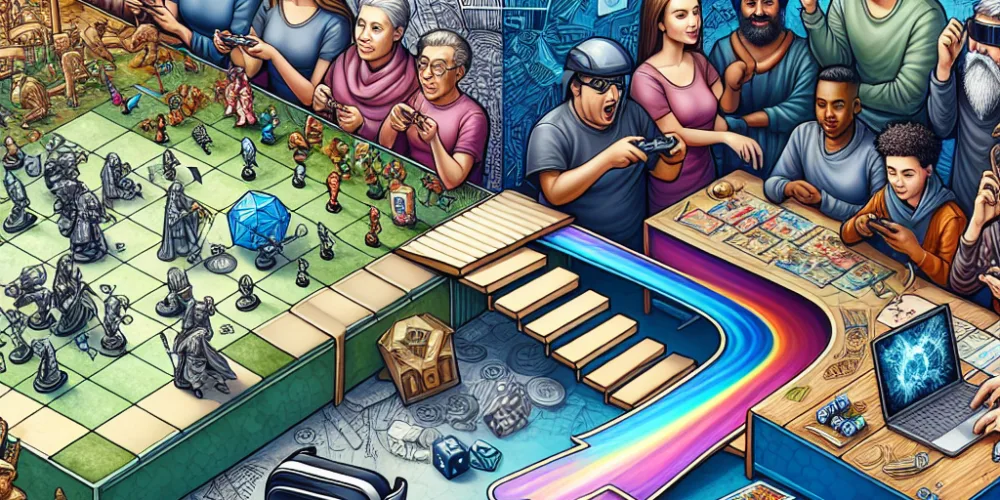In an era dominated by high-resolution video games and virtual reality experiences, a surprising trend is reshaping the gaming landscape: the resurgence of tabletop games. These physical game formats, ranging from classic board games like “Monopoly” and “Risk” to more complex role-playing games like “Dungeons & Dragons,” are experiencing a renaissance, attracting a diverse audience seeking tactile and social interaction in their gaming experiences.
According to recent industry reports, the global board game market is projected to grow by $5.81 billion between 2020 and 2024. This resurgence is fueled not just by nostalgia but also by a growing appreciation of the unique social interactions that tabletop games provide. In a digital world, the appeal of sitting around a table with friends or family, sharing a direct social interaction, is becoming a valued commodity.
Why Are Tabletop Games Gaining Popularity?
Several factors contribute to the rising popularity of tabletop games. First, the social aspect of these games is their most significant selling point. Unlike online gaming where interactions are often virtual, tabletop games bring people together in the same physical space. During the recent global lockdowns, many turned to board games as a form of entertainment that also allowed for bonding with those in their immediate circles.
Furthermore, the market for tabletop games has been revitalized by innovations in game design. Modern board games are more diverse and sophisticated than ever before, ranging from strategic board games that can span several hours to simple, quick family games. Game designers are continually exploring new themes and mechanics, leading to games that are more engaging and appealing to a broader audience.
The rise of crowdfunding platforms like Kickstarter has also played a crucial role in the tabletop game industry’s growth. Independent creators have been empowered to bring their visions to life without the need for traditional publishing and distribution channels. These platforms have not only democratized game production but have also helped gauge public interest and secure funding based on actual demand.
The Role of Digital Technology in Promoting Tabletop Games
Interestingly, while digital technology could be seen as a competitor, it has significantly complemented the growth of tabletop games. Virtual tabletop gaming platforms like “Roll20” and “Tabletop Simulator” allow players to participate in board games over the internet, breaking geographical barriers that previously limited play. These platforms have become especially popular amidst travel restrictions and social distancing guidelines, introducing board games to a global audience.
Moreover, many tabletop games are now integrated with apps and digital content, which enhance gameplay with sound effects, digital scorekeeping, or augmented reality features. These integrations offer an attractive compromise for tech-savvy players, combining the charm of physical board games with the convenience and interactivity of digital enhancements.
The Cultural Impact of Tabletop Games
The impact of tabletop games extends beyond entertainment. Educational professionals have noted the benefits of board games in learning and development. Skills such as problem-solving, strategic thinking, and even basic arithmetic are often integral to gameplay. Additionally, board games can serve as educational tools, introducing players to complex concepts like economics, historical events, or scientific principles in an engaging way.
Moreover, the communal aspect of tabletop games strengthens interpersonal skills such as communication, negotiation, and conflict resolution. These games often require players to work together or engage in discussions, which can improve verbal articulation and empathy.
Conclusion
As digital technologies continue to permeate every aspect of life, the unexpected rise of tabletop games highlights a counter-trend that values physical interaction and community. Looking forward, the tabletop game industry appears poised for continued growth, with innovations that integrate the best of both digital and physical gaming worlds. Whether as a form of entertainment, a tool for learning, or a means to socialize, tabletop games are enjoying a well-deserved renaissance in the digital age, proving that sometimes, the oldest forms of play can be the most resilient.

Karine Gomez is an enthusiastic writer and avid gamer with a particular love for PlayStation and casino gaming. Her deep knowledge of gaming trends and casino dynamics makes her articles both informative and engaging. Karine’s passion for PlayStation games and her firsthand experience with casino play shine through in her writing, offering readers authentic insights and valuable tips.

